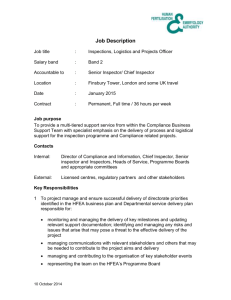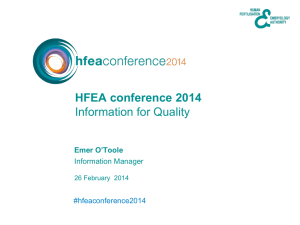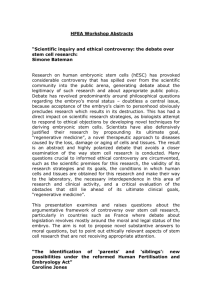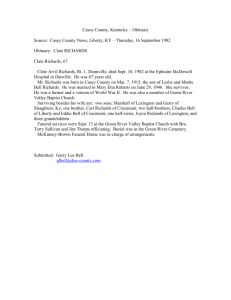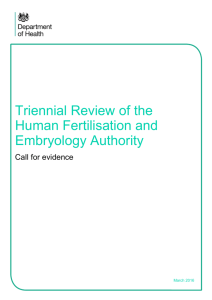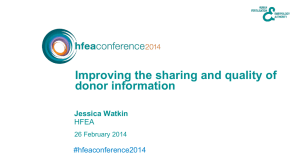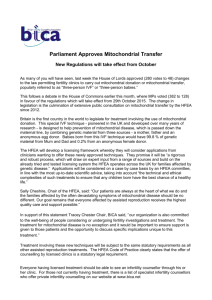Court of Appeal Judgment Template
advertisement
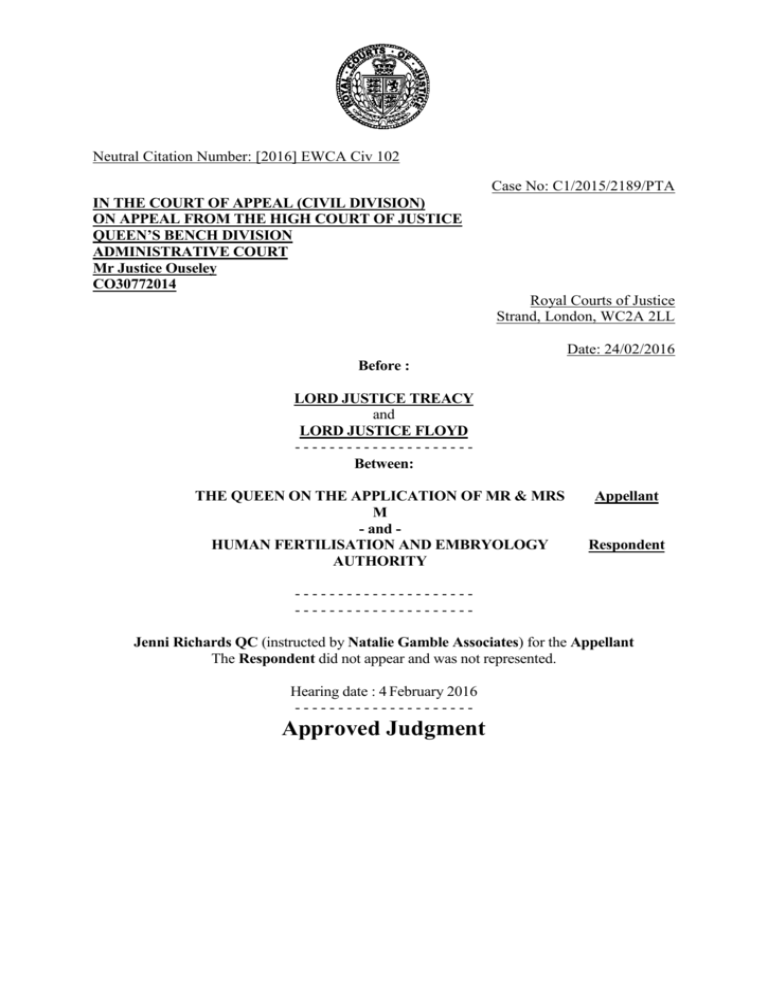
Neutral Citation Number: [2016] EWCA Civ 102 Case No: C1/2015/2189/PTA IN THE COURT OF APPEAL (CIVIL DIVISION) ON APPEAL FROM THE HIGH COURT OF JUSTICE QUEEN’S BENCH DIVISION ADMINISTRATIVE COURT Mr Justice Ouseley CO30772014 Royal Courts of Justice Strand, London, WC2A 2LL Date: 24/02/2016 Before : LORD JUSTICE TREACY and LORD JUSTICE FLOYD --------------------Between: THE QUEEN ON THE APPLICATION OF MR & MRS M - and HUMAN FERTILISATION AND EMBRYOLOGY AUTHORITY Appellant Respondent ----------------------------------------Jenni Richards QC (instructed by Natalie Gamble Associates) for the Appellant The Respondent did not appear and was not represented. Hearing date : 4 February 2016 --------------------- Approved Judgment Judgment Approved by the court for handing down. R (on the application of) Mr & Mrs M v HFEA Lord Justice Treacy : 1. The appellants seek permission to appeal the order of Ouseley J of 15 June 2015 dismissing their claim for judicial review of a decision of the respondent, the Human Fertilisation and Embryology Authority (HFEA). The HFEA had refused a special direction under the Human Fertilisation and Embryology Act 1990 (the Act) permitting the export of the claimants’ daughter’s (AM’s) gametes (frozen eggs) to a treatment centre in New York so that they could be fertilised and implanted into IM, AM’s mother. 2. It was accepted by the appellants that they could not satisfy certain requirements necessary to enable the export of AM’s gametes abroad under the general directions pursuant to the Act. Where those requirements cannot be met the respondent may issue a special direction permitting export. Such special directions permitting export may permit the requirement for written consent by the gamete provider to be modified. 3. Although a number of grounds are raised they centre upon the question of whether AM during her lifetime gave a sufficiently informed consent to the procedures now proposed so as to enable a special direction to be given. I have to say that on a reading of the papers I was doubtful whether the appellants would be able to establish a sufficiently strong case so as to enable this matter to go forward. However we have had the benefit of clear and persuasive submissions from Ms Jenni Richards QC which have led me to change my mind and to conclude that there is an arguable case with a real prospect of success. 4. It seems to me that it is arguable that the HFEA and the judge took too stringent an approach to the question of special directions. Ms Richards took us to various forms which are part of the process and argued that they supported her contentions and that the available evidence had been examined in a way which took too narrow an approach. An important part of her submissions was that there had been inappropriate emphasis on what AM had not done or said rather than what she had done and said prior to her death. There had been a failure to approach the available evidence correctly in relation to an important part of the evidence, namely a conversation between AM and her mother in January 2010. The judge had acknowledged that HFEA had taken too narrow an approach but had gone on to hold that the claim for judicial review should be dismissed. 5. Ms Richards QC was critical of the conclusion of HFEA at paragraph 36 of its decision: “None of the conversations contemplated or considered the use of donor sperm outside the UK and the particular implications of such arrangements.” She argued that AM had no reason to know that treatment in the UK would not be possible or permitted. 6. Ms Richards also criticised passages in paragraphs 46 and 51 of Ouseley J’s judgment as imposing a greater burden on the appellants than the Act required in an assessment of AM’s intentions and understanding. Overall it was submitted that where the Judgment Approved by the court for handing down. R (on the application of) Mr & Mrs M v HFEA statutory scheme permits consent requirements to be modified the approach of HFEA and the judge had been to adopt a more rigorous approach than the statute required. 7. Moreover, it was contended that the approach taken failed to take sufficient account of AM’s terminal condition, particularly in circumstances where it was said that she had no reason to know that further decisions on her part were required or that it was necessary for evidence of them to be obtained. 8. On reflection I consider that there was enough in the points made by Ms Richards to warrant a grant of permission centring around the issue of whether, in the circumstances, an improperly rigorous approach was adopted to the question of special directions. Given the interrelationship between the four grounds advanced, I would permit the whole matter to be argued. I give a time estimate of one day. Lord Justice Floyd : 9. Like Treacy LJ, my initial reaction was to refuse permission, but I was persuaded by the oral advocacy of Ms Richards that her arguments deserve the attention of the full court. For the reasons Treacy LJ has given I agree that we should grant permission.
